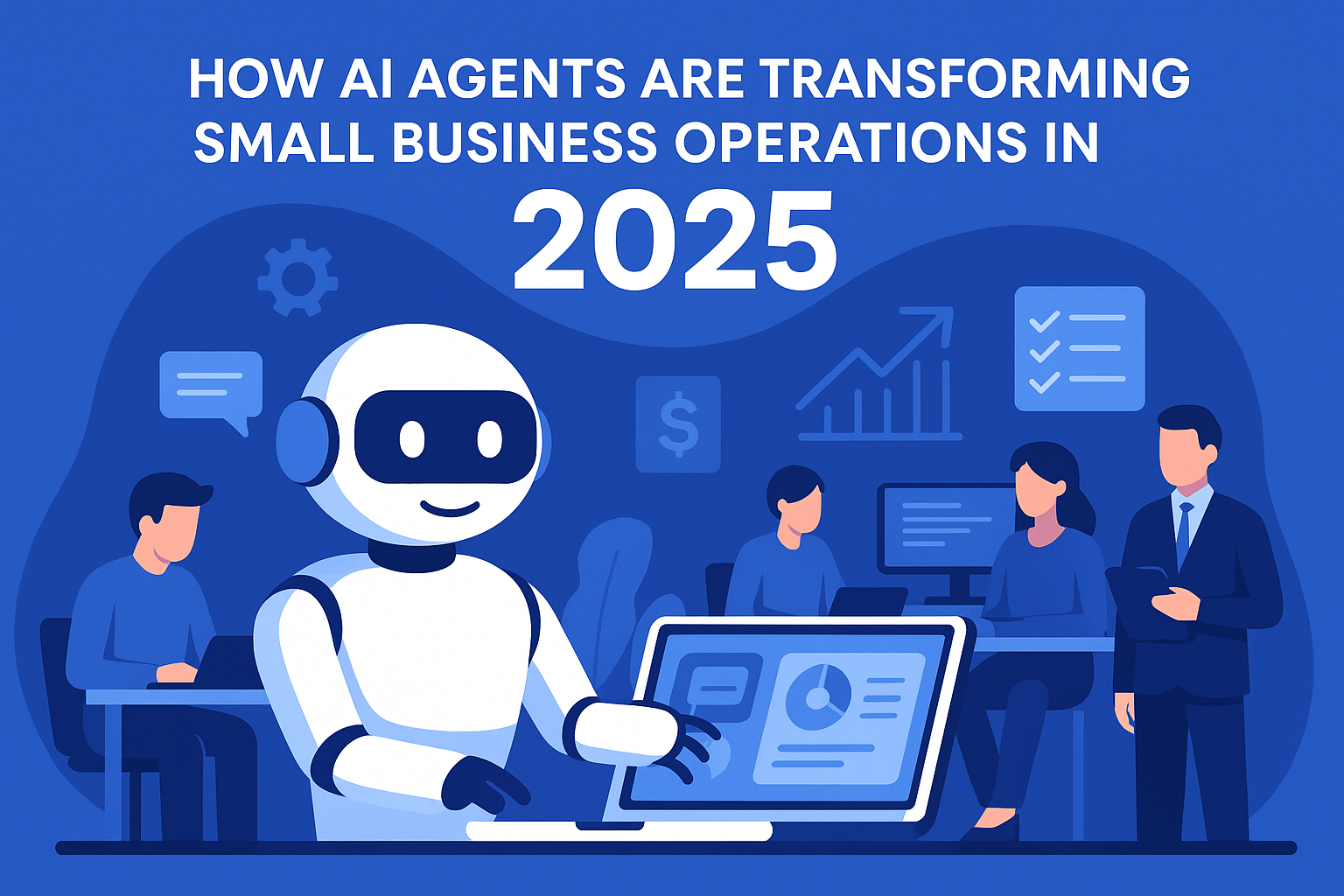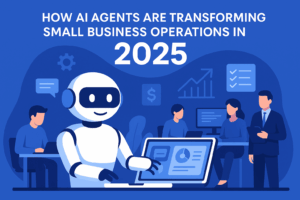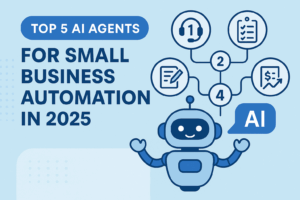Picture this: a team member who works 24/7, never takes sick days, learns continuously from every interaction, and costs a fraction of a full-time hire. That’s not science fiction—that’s the reality AI agents for small business are delivering right now in 2025.
We’re witnessing something unprecedented. Small businesses that once required teams of 5-10 people to manage operations are now running more efficiently with 2-3 humans working alongside intelligent AI agents. The transformation isn’t just about cutting costs—it’s about unlocking capabilities that were previously impossible for smaller teams.
But here’s what separates the businesses thriving with AI agents from those still struggling with basic automation: understanding that AI agents aren’t just advanced tools. They’re autonomous team members that observe, plan, and act independently while continuously learning and adapting to your specific business needs.
After implementing AI agents across dozens of small and midsized businesses, we’ve seen the profound impact they’re having on how work gets done. Here’s what’s actually happening on the ground.
What Makes AI Agents Different from Everything Else?
Traditional software requires constant human input. Even sophisticated automation breaks when conditions change. AI agents for small business operate fundamentally differently—they think, decide, and execute tasks with the kind of contextual understanding that was previously uniquely human.
Here’s how they actually work:
They observe continuously – AI agents constantly monitor their environment, tracking customer interactions, performance metrics, and changing business conditions. They retain memory across all interactions, building context that informs every decision.
They plan strategically – Using advanced language models, agents evaluate situations, prioritize actions, and develop multi-step plans to accomplish goals. They don’t just follow scripts—they adapt their approach based on real-time conditions.
They act autonomously – AI agents execute tasks by interfacing with your existing systems—CRM, email, accounting software, websites. They can delegate to other agents, request human input when needed, and learn from both successes and mistakes.
This observe-plan-act cycle creates agents that become more effective over time, learning your business patterns and optimizing their performance continuously.
The Real Business Impact We’re Seeing
The numbers from our client implementations tell a compelling story:
Marketing operations: One professional services firm reduced their content creation cycle from 4 weeks to 1 day while improving consistency and brand voice adherence. Their AI agent now manages their entire content calendar, social media posting, and email sequences.
Customer service: A small e-commerce company replaced their need for 24/7 support staff with an AI agent that handles 80% of inquiries automatically. Customer response time improved from 4 hours to 30 seconds, while satisfaction scores increased by 35%.
Financial operations: A consulting firm that previously required 10 hours weekly for invoicing, expense tracking, and financial reporting now completes these tasks in under an hour. Their AI agent handles everything from generating invoices to sending payment reminders and providing cash flow insights.
Sales and lead management: A B2B service company increased their qualified lead volume by 300% while reducing the time spent on prospecting by 75%. Their AI agent continuously identifies prospects, personalizes outreach, and nurtures leads through complex multi-touch sequences.
How Small Businesses Are Actually Using AI Agents
The most successful implementations we’ve seen focus on three core areas where AI agents deliver immediate value:
1. Automating Standardized Business Processes
AI agents excel at handling repetitive tasks that follow predictable patterns but require contextual decision-making. Unlike rigid automation that breaks when conditions change, agents adapt their approach while maintaining consistency.
Real examples:
- Invoice processing: Agents that not only generate invoices but adjust payment terms based on client history and current cash flow needs
- Lead qualification: Agents that engage prospects with personalized questions, evaluate responses, and route qualified leads to appropriate team members
- Content creation: Agents that maintain brand voice while adapting messaging for different audiences and channels
2. Enhancing Human Team Performance
The best AI agent implementations don’t replace humans—they amplify human capabilities by handling routine tasks and providing intelligent insights that inform strategic decisions.
Practical applications:
- Research and analysis: Agents that continuously monitor competitors, industry trends, and market opportunities, delivering actionable insights to business owners
- Customer relationship management: Agents that track customer interactions across all touchpoints, flagging opportunities for upsells or identifying at-risk accounts
- Project management: Agents that monitor project progress, anticipate bottlenecks, and automatically adjust timelines and resource allocation
3. Scaling Operations Without Scaling Costs
Perhaps most importantly for small businesses, AI agents enable growth without proportional increases in overhead. They can replicate quickly and handle increased workload without the time and cost associated with hiring and training new employees.
Growth enablers:
- Market expansion: Agents that research new markets, identify prospects, and execute initial outreach campaigns
- Service delivery: Agents that handle customer onboarding, provide technical support, and manage ongoing client communications
- Business intelligence: Agents that analyze performance data, identify optimization opportunities, and provide recommendations for strategic decisions
The Competitive Advantage of Early Adoption
The businesses implementing AI agents now aren’t just improving efficiency—they’re building sustainable competitive advantages. Here’s why timing matters:
Market positioning: While competitors debate whether AI is ready, early adopters are capturing market share with faster response times, more personalized service, and better operational efficiency.
Learning advantage: AI agents improve over time. The businesses starting now will have agents with months or years of learning and optimization while their competitors are just getting started.
Cost structure benefits: Companies using AI agents can offer competitive pricing while maintaining higher margins, or invest savings into growth initiatives that competitors can’t match.
Talent leverage: Small teams working with AI agents can accomplish what previously required much larger teams, enabling rapid scaling without the challenges of hiring and managing large workforces.
What This Means for Your Business
The transformation isn’t coming—it’s here. The question isn’t whether AI agents will change how small businesses operate, but how quickly you can adapt to leverage their capabilities.
For service businesses: AI agents can handle client communications, project updates, and routine deliverables, allowing you to focus on high-value strategic work and business development.
For e-commerce: Agents can manage customer inquiries, process orders, handle returns, and even optimize inventory based on demand patterns and market trends.
For professional services: AI agents can draft proposals, manage client onboarding, track project progress, and provide business intelligence that informs strategic decisions.
For consultancies: Agents can conduct research, create content, manage client relationships, and handle administrative tasks that typically consume significant time.
Building Your AI Agent Strategy
The most successful AI agent implementations follow a strategic approach:
Start with high-impact, low-risk processes: Identify routine tasks that consume significant time but have predictable patterns. These are ideal starting points for AI agent implementation.
Focus on integration, not disruption: Choose agents that work with your existing systems and workflows rather than requiring complete process overhauls.
Plan for continuous improvement: AI agents get better over time. Build feedback loops and optimization processes into your implementation strategy.
Maintain human oversight: The best AI agents know when to escalate to humans. Ensure you have appropriate review processes and fail-safes in place.
The Future is Autonomous Operations
We’re moving toward a future where small businesses operate more like highly efficient, technology-enabled teams rather than traditional small companies limited by manual processes and human bandwidth.
The best AI agents 2025 are creating possibilities that didn’t exist even six months ago. Businesses that embrace this transformation now will be positioned to capture disproportionate value as the technology continues to evolve.
Ready to explore how AI agents can transform your business operations? At Upline, we help small and midsized businesses identify the highest-impact opportunities for AI agent implementation. We’ll assess your current processes, recommend specific agents for your needs, and ensure seamless integration that enhances rather than disrupts your operations.
The future of small business operations is autonomous, intelligent, and incredibly efficient. The question is: will you be leading this transformation or following it?
Schedule a consultation to discover how AI agents can give your business the competitive advantage that separates market leaders from the rest.




